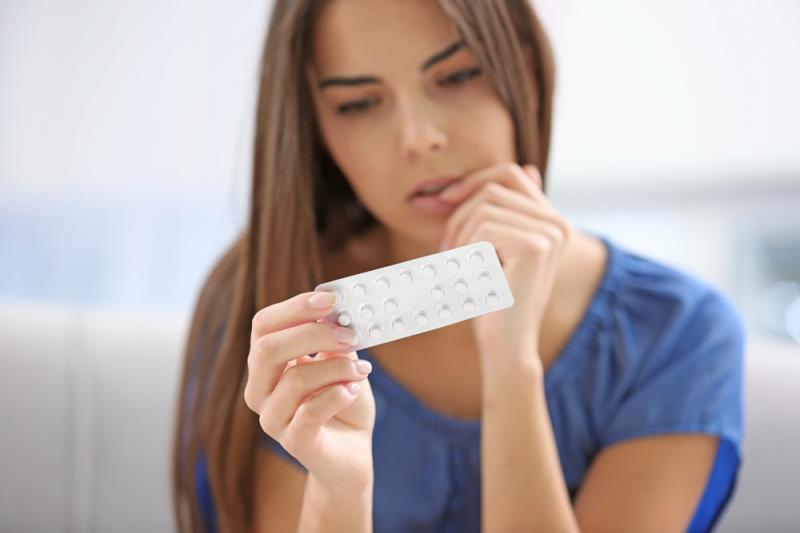
Concurrent depressive symptoms were more commonly reported in 16-year-old oral contraceptive pill (OCP) users compared with OCP non-users, according to a recent analysis of data from a prospective Dutch population survey.
The analysis showed a significant association between OCP use and depressive symptoms (based on the DSM-IV–oriented affective problems scale of Youth [age, 16 years] and Adult Self-Report [age, 19, 22 and 25 years]) in all OCP users combined (mean age, 16.3–25.6 years) (β coefficient, 0.006; 95 percent CI, -0.013 to 0.025; p=0.52). However, 16-year-old girls who used OCPs reported significantly higher depressive symptom scores compared with their non-OCP-using counterparts (mean score, 0.40 vs 0.33; β coefficient, 0.075; 95 percent confidence interval [Cl], 0.033 to 0.120; p<0.001), and the association persisted after adjustment for age (β coefficient for age × OCP use, -0.021; 95 percent CI, -0.038 to -0.005; p=0.0096). [JAMA Psychiatry 2019, doi: 10.1001/jamapsychiatry.2019.2838]
Use of OCPs among 16-year-old girls was significantly associated with increased crying (odds ratio [OR], 1.89; 95 percent CI, 1.38 to 2.58; p<0.001), eating problems (OR, 1.54; 95 percent CI, 1.13 to 2.10; p=0.009) and hypersomnia (OR, 1.68; 95 percent CI, 1.14 to 2.48; p=0.006).
The association between OCP use and depressive symptoms was significantly weaker in girls with a history of depression prior to OCP use (β coefficient, 0.040; 95 percent CI, 0.001 to 0.079; p=0.046), and the depressive symptoms were likely to diminish with long-term OCP use (up to 3, 6, 9 and 12 years) (β coefficient, -0.007; 95 percent CI, -0.024 to 0.009; p=0.39).
None of the residual confounding factors and pre-existing differences, including virginity, stressful events, menstruation-related pain and acne, at the age of 13 years, diminished the association between OCP use and depressive symptoms at the age of 16 years.
In this prospective cohort study, data were obtained from the Dutch TRAILS population survey (Tracking Adolescents’ Individual Lives Survey). The data from 1,010 girls (mean age at the first assessment of OCP use, 16.3 years; mean age at the final assessment of OCP use, 25.6 years) who had filled out ≥1 and ≤4 assessments of OCP use were analyzed.
At baseline, OCP users were more likely to have a lower mean socioeconomic status (-0.15 vs 0.17) and to be of non-Dutch ethnicity (14.2 percent vs 7.8 percent) and less likely to be a virgin (24.4 percent vs 79.5 percent) compared with non-users.
OCP use is often stopped by different reasons, including mood changes, and the degree of changes could vary. Previous studies showed that the incidence of OCP adverse effects may depend on age, whereby adolescents on OCPs were more likely to seek psychiatric help and use psychotropic drugs compared with adult users. [Am J Obstet Gynecol 1998;179:577-582; PLoS One 2018;13(3):e0194773; JAMA Psychiatry 2016;73:1154-1162]
In this study, 16-year-old OCP users were found to have higher concurrent depressive symptoms scores compared with their non-OCP-using counterparts, with increases in crying, hypersomnia and eating problems, and the symptoms diminished once they entered adulthood. “Monitoring these symptoms is important, as they may affect quality of life and put OCP users at risk for nonadherence,” concluded the researchers.